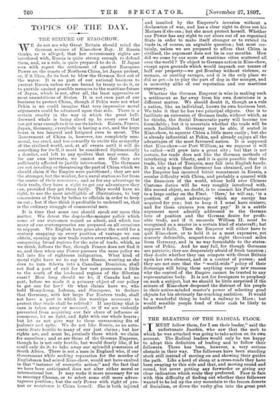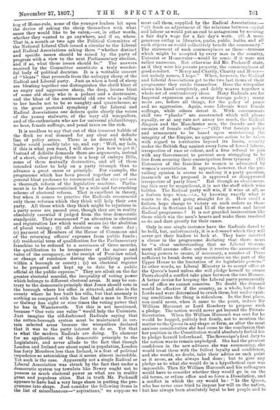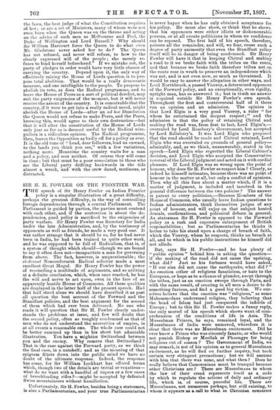THE BLEATING OF THE RADICAL FLOCK.
"T MUST follow them, for I am their leader," said the unfortunate Jacobin, who saw that the mob to which he was attached was going to take action on its own account. The Radical leaders would only be too happy to adopt this definition of leading and to follow their followers. There has been, however, a very serions• obstacle in their way. The followers have been standing stock still instead of moving on and showing their guides the path. Like a herd of sheep at a cross-roads they have been swaying to this side and that, and moving round and round, but never getting any forwarder or giving any clear indication which route they preferred. Face to face with this difficulty of finding out whether their followers wanted to be led up the airy mountain to the frozen deserts of Socialism, or down the rushy glen into the great peat bog of Home-rule, some of the younger leaders hit upon the device of asking the sheep themselves with what sauce they would like to be eaten,—or, in other words, whether they wanted to go anywhere, and if so, where. That is, a month or two ago the Political Committee of the National Liberal Club issued a circular to the Liberal and Radical Associations asking them "whether distinct and specific issues should be raised by the party of progress with a view to the next Parliamentary election, and if so, what these issues should be." The answers received by the Committee constitute a truly wonder- ful body of political doctrine. It is a veritable concert of " bleats " that proceeds from the unhappy sheep of the Radical and Liberal party. Just as when a herd of sheep are bleating together one distinguishes the shrill bleat of an angry and aggressive sheep, the deep, hoarse bleat of some old sheep who is a pedant and a doctrinaire, and the bleat of the sentimental old ewe who is calling to her lambs not to be so naughty and quarrelsome, so in the great pastoral symphony of the Liberal and Radical Associations one detects quite clearly the voices of the young stalwarts, of the wary old wirepullers, and of the enthusiasts who are for universal philanthropy, no beer, female suffrage, and penal taxes on the rich.
It is needless to say that out of this innocent babble of the flock no real demand for any clear and definite line of policy arises. There is no demand which a leader could possibly take up, and say : Well, my lads, if this is what you want, I will show you how to get it.' Instead of definite demands there are arguments, instead of a short, clear policy there is a heap of embryo Bills, some of them mutually destructive, and all of them intended rather to help on a party triumph than to advance a great cause or principle. For example, the programme which has been pieced together out of the general bleat professes to recommend as the sine qua non a thorough reform of the legislative machine. Parlia- ment is to be democraticised by a wide and far-reaching scheme of electoral reform. That is excellent in theory, but when it comes to practice the Radicals recommend only those reforms which they think will help their own party. All those which they think might be injurious in a party sense are passed over, though they are in reality absolutely essential if judged from the true democratic standpoint. They recommend "an alteration in electoral and registration law which would secure (a) the abolition of plural voting ; (b) all elections on the same day ; (c) payment of Members of the House of Commons and of the returning officers' expenses from public funds ; (d) residential term of qualification for the Parliamentary franchise to be reduced to a maximum of three months, the qualification to be irrespective of the nature and value of the occupancy, or the receipt of Poor-law relief, or change of residence during the qualifying period -within a borough or county ; (e) an electoral register to be prepared and kept up to date by a public official at the public expense." They are silent on the far greater electoral scandal, the inequality of voting power which belongs to different electoral areas. It may be con- trary to the democratic principle that Jones should vote in the borough where his office is situated, and also in the county where he has built his villa, but that anomaly is nothing as compared with the fact that a man in Newry or Galway has eight or nine times the voting power that he has in Wandsworth. Yet this is not mentioned, because "One vote one value" would help the Unionists. Just imagine the old-fashioned Radicals saying that the rotten-borough system must be maintained in cer- tain selected areas because the wirepullers declared that it was to the party interest to do so. Yet that is what the modern Radicals are doing. To clamour for an application of the democratic principle to the Legislature, and never allude to tire fact that though London and Ireland are about equal in population, London has forty Members less than Ireland, is a feat of political impudence so astonishing that it seems almost incredible. Yet such is the case. Apparently not a single Radical or Liberal Association was struck by the fact that under a democratic system toy townlets like Newry ought not to possess as much electoral power as what are in reality great and populous cities. But in truth Mr. Pecksniff appears to have had a very large share in putting the pro- gramme into shape. Just consider the following items in the list of miscellaneous—" aspirations," we suppose we must call them, supplied by the Radical A esociations:— " (6) Such an adjustment of the relations between capital and labour as would put an end to antagonism by securing a fair day's wage for a fair day's work. (8) A more generous outlay in libraries, parks, public baths, and all such objects as would collectively benefit the community." The statement of such commonplaces as these—truisms which might be accepted by every man in the country, Unionist or Home-ruler—would be comic if it were not rather nauseous. Not otherwise did Mr. Pecksuiff state, as if they were his private property, the commonplaces of good conduct. "Mercy and Charity, Charity and Mercy— not unholy names, I hope." When, however, the Radical and Liberal Associations get to the two last items of their programme they outdo themselves. Here the wirepuller shows his hand completely, and deftly weaves together a whole set of contradictory ideas. Many Radicals are for Imperial expansion and a strong foreign policy ; many more are, before all things, for the policy of peace and no aggression. Again, some Liberals want female suffrage, while others detest it. With consummate skill two " planks " are constructed which will please equally, or at any rate not annoy too much, the Radical Jingoes and the Manchester men, the friends and the enemies of female suffrage :—" (12) Our foreign policy and armaments to be based upon maintaining the integrity of the Empire, no aggressive action to be taken with regard to territories beyond its limits, security under the British flag against every form of forced labour, irrespective of race or colour, and a firm refusal to join with any Government to prevent men struggling to be free from securing their emancipation from tyranny. (13) Extension of the franchise to women is advocated by women's associations. It appears, however, that the pre- vailing opinion is averse to making it a party question. inasmuch as the proposal is approved or disapproved irrespective of party lines." But though as electioneer- ing this may be magnificent, it is not the stuff which wins battles. The Radical party will win, if it wins at all, as a forlorn hope wius,—i.e., by knowing exactly what it wants to do, and going straight for it. How could a forlorn hope charge to victory on such orders as those disclosed in Sections 12 and 13 of the newest and latest Radical programme ? It is not guarded insincerities like these which win the men's hearts and make them resolved to do and dare greatly for their cause.
Only in one single instance have the Radicals dared to be bold, but, unfortunately, it is a demand which they will never get their leaders to look at. They have inserted a clause in the programme declaring that there must be "a clear understanding that no Liberal Govern- ment will assume office unless it receive the assurance of having powers to create, if necessary, a number of Peers sufficient to break down any resistance on the part of the Upper House to the limitation of its legislative powers." In other words, no Liberal Ministry is to accept office at the Queen's hand unless she will pledge herself to create Peers should a conflict take place between the two Houses. A better device for keeping the Liberal party permanently out of office we cannot conceive. No doubt the demand would be effective if the country, as a whole, hated the Lords and were determined to crush them, but under exist- ing conditions the thing is ridiculous. In the first place, you could never, when it came to the point, induce Sir William Harcourt or Lord Rosebery to propose such a pledge. The notion would never get beyond the Private Secretaries. When Sir William Harcourt was sent for he would be begged, politely but firmly, not to mention the matter to the Queen in any shape or form, as after the most anxious consideration she had come to the conclusion that her position in the Constitution would absolutely forbid her to pledge herself beforehand. The Sovereign's first duty to the nation was to remain unpledged. She had the greatest confidence in the new advisers she was summoning, she would treat them with the fullest loyalty and confidence, and she would, no doubt, take their advice on each point as it arose, as she always had done ; but to give any pledge as to what she would do in a hypothetical case was impossible. Then Sir William Harcourt and his colleagues would have to consider whether they would go in on the old terms, or refuse office and so force a Dissolution, and a, conflict in which the cry would be : "Is the Queen, who has never once tried to impose her will on the nation, but has always been absolutely loyal to her people and to the laws, the best judge of what the Constitution requires of her ; or are a set of Ministers, many of whom were not even born when the Queen was on the throne and acting on the advice of such men as Melbourne and Peel, the Duke of Wellington and Lord Russell ? Why should Sir William Harcourt force the Queen to do what even Mr. Gladstone never asked her to do ? The Queen has not refused, and never will refuse, to bow to the clearly expressed will of the people ; she merely re- fuses to bind herself beforehand." If we mistake not, the party of pledges to order would have very little chance of carrying the country. Depend upon it, the only way of effectively raising the House of Lords question is to pro- pose total abolition. That would be a really democratic measure, and one intelligible to the people. To propose to abolish its veto, as does the Radical programme, and to leave the House of Peers as a sort of political derelict, may suit the party exigencies of the moment, but it will never receive the assent of the country. It is conceivable that the country, if it were to get into a really radical mood, might abolish the House of Lords—after an ad hoc Dissolution the Queen would not refuse to make Peers, and the Peers, knowing this, would agree to their own destruction—but that it will alter the constitution of the House of Lords only just so far as is deemed useful by the Radical wire- pullers is a ridiculous opinion. The Radical programme, then, leaves the Opposition as badly off for a policy as ever. It is the old tune of "Lead, dear followers, lead us onward, to the lands you think you see," with a few variations, nothing more. Meantime the country waits for a man and a policy, and sees neither. Of course they will come in time ; but that must be a poor consolation to those who see the Liberal party drifting backwards in the tide almost a wreck, and with the crew dazed, mutinous, or distracted.








































 Previous page
Previous page